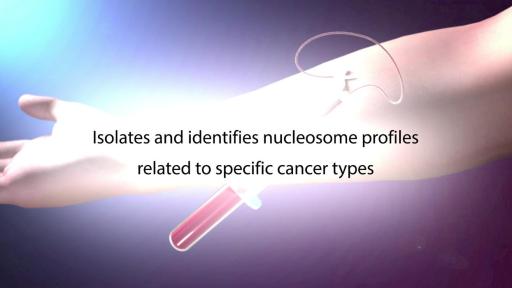VolitionRx Demonstrates NuQ® Blood Test Detects 95% of Pancreatic Cancers in Second Preliminary Study
Corroborates Results from Initial Pancreatic Cancer Study published in Clinical Epigenetics
PR Newswire, Namur, Belgium, October 22, 2015
VolitionRx Limited (NYSE MKT: VNRX) today announced that the Company’s NuQ® blood test has accurately detected 95% (19 out of 20) of pancreatic cancers within a 4,800-subject cancer trial at Hvidovre Hospital, University of Copenhagen in Denmark.
Overall, the 4,800-patient retrospective study was conducted to detect colorectal cancer (CRC). However this patient cohort also included 166 patients who, although suspected for CRC, were found to have a different cancer. Of these 166 patients, 20 patients were diagnosed with pancreatic cancer.
Analysis of patients’ blood samples demonstrated that a panel of two NuQ® assays and the classical cancer marker CEA (carcino-embryonic antigen) distinguished 95% of pancreatic cancer cases from healthy subjects at 84% specificity.
Pancreatic cancer is one of the most deadly and difficult to detect and diagnose cancers, as the signs and symptoms are similar to many other illnesses. There are more than 40,000 deaths and over 50,000 new cases diagnosed each year in the U.S. alone, and the five-year survival rate for pancreatic cancer is currently just 7%1. Pancreatic cancer is projected to become the second leading cause of cancer-related death in the U.S. by 20302.
VolitionRx Chief Scientific Officer, Dr. Jake Micallef, commented, “Although this study was not designed specifically as a pancreatic cancer study and the NuQ® assays used were not tailored for pancreatic cancer detection, it is very encouraging that a NuQ® panel test nonetheless detected nearly all the pancreatic cancer cases in this patient set. This substantiates the highly encouraging results from our previous pancreatic cancer trial that were recently published in the journal Clinical Epigenetics.”
“Existing screening tests for pancreatic cancer are far from ideal, and tend to be either very invasive, expensive or inaccurate. VolitionRx strongly believes that blood-based testing for pancreatic and other cancers is the best platform for screening patients. These results provide compelling evidence that VolitionRx has an accurate, cost-effective, non-invasive, blood-based solution for pancreatic cancer diagnosis,” concluded Dr. Micallef.
VolitionRx Chief Executive Officer, Cameron Reynolds, added, “We now have confirmation of pancreatic cancer detection at a very high rate, in two completely different patient sets collected independently in different countries. Moreover, this second patient set is a large sample set. These very encouraging results provide significant confidence to move forward with a large, dedicated pancreatic cancer study. At this time, we believe pancreatic cancer has the highest likelihood of being the second cancer for which we bring a NuQ® panel test to market, following CRC. Pancreatic cancer is deadly and currently very difficult to diagnose early, and we hope to provide a solution to this high unmet medical need.”
The pancreatic cancer results from the Danish study compare favorably with the recently published results from VolitionRx’s trial with Lund University in Sweden, which demonstrated a detection rate of 92% (23 of 25) of cancer cases at 100% specificity using a panel of four NuQ® assays and the classical CA19-9 cancer biomarker. Full details were published in the journal Clinical Epigenetics: http://www.clinicalepigeneticsjournal.com/content/pdf/s13148-015-0139-4.pdf.
Last month, VolitionRx announced interim CRC results from the 4,800-subject trial at Hvidovre Hospital, which indicated that its NuQ® blood tests detected 81% of colorectal cancers at 78% specificity equally well for both for early- and late-stage cancers.
The NuQ® tests utilize the Company’s proprietary Nucleosomics® technology platform, which identifies and measures circulating fragments of DNA, called nucleosomes, for the presence of epigenetic cancer signals within the blood. Full details of ongoing clinical trials can be found at http://www.volitionrx.com/technology/clinical-trials-collaborations.
-End-
References:
1. National Cancer Institute. “SEER Stat Fact Sheets: Pancreas Cancer.” April 2015. Available online at: http://seer.cancer.gov/statfacts/html/pancreas.html. Accessed September 23, 2015.
2. Cancer Research. "Projecting Cancer Incidence and Deaths to 2030: The Unexpected Burden of Thyroid, Liver, and Pancreas Cancers in the United States." 2014. Available online at: http://cancerres.aacrjournals.org/content/early/2014/03/25/0008-5472.CAN-14-0155.full.pdf. Accessed September 25, 2015.
About VolitionRx
VolitionRx is a life sciences company focused on developing diagnostic tests for cancer and other conditions. The tests are based on the science of Nucleosomics®, which is the practice of identifying and measuring nucleosomes in the bloodstream or other bodily fluid – an indication that disease is present.
VolitionRx’s goal is to make the tests as common and simple to use, for both patients and doctors, as existing diabetic and cholesterol blood tests. VolitionRx’s research and development activities are currently centered in Belgium as the company focuses on bringing its diagnostic products to market first in Europe, then in the U.S. and ultimately, worldwide.
Visit VolitionRx’s website (http://www.volitionrx.com) or connect with us via Twitter, LinkedIn, Facebook or YouTube.
Media Contacts
Anita Heward, VolitionRx
[email protected]
+44 (0) 7756 034243
Kirsten Thomas, The Ruth Group
[email protected]
+1 (508) 280-6592
Investor Contacts
Scott Powell, VolitionRx
[email protected]
+1 (646) 650-1351
Lee Roth, The Ruth Group
[email protected]
+1 (646) 536-7012
Safe Harbor Statement
Statements in this press release may be “forward-looking statements” within the meaning of Section 27A of the Securities Act of 1933, as amended, and Section 21E of the Securities Exchange Act of 1934, as amended, that concern matters that involve risks and uncertainties that could cause actual results to differ materially from those anticipated or projected in the forward-looking statements. Words such as "expects," "anticipates," "intends," "plans," “aims,” “targets,” "believes," "seeks," "estimates," "optimizing," "potential," "goal," "suggests" and similar expressions identify forward-looking statements. These forward-looking statements relate to the effectiveness of the Company’s bodily-fluid-based diagnostic tests as well as the Company’s ability to develop and successfully commercialize such test platforms for early detection of cancer. The Company’s actual results may differ materially from those indicated in these forward-looking statements due to numerous risks and uncertainties. For instance, if we fail to develop and commercialize diagnostic products, we may be unable to execute our plan of operations. Other risks and uncertainties include the Company’s failure to obtain necessary regulatory clearances or approvals to distribute and market future products in the clinical IVD market; a failure by the marketplace to accept the products in the Company’s development pipeline or any other diagnostic products the Company might develop; the Company will face fierce competition and the Company’s intended products may become obsolete due to the highly competitive nature of the diagnostics market and its rapid technological change; and other risks identified in the Company’s most recent Annual Report on Form 10-K and Quarterly Reports on Form 10-Q, as well as other documents that the Company files with the Securities and Exchange Commission. These statements are based on current expectations, estimates and projections about the Company’s business based, in part, on assumptions made by management. These statements are not guarantees of future performance and involve risks, uncertainties and assumptions that are difficult to predict. Forward-looking statements are made as of the date of this release, and, except as required by law, the Company does not undertake an obligation to update its forward-looking statements to reflect future events or circumstances.
Nucleosomics®, NuQ® and HyperGenomics® and their respective logos are trademarks and/or service marks of VolitionRx Limited and its subsidiaries. All other trademarks, service marks and trade names referred to in this are the property of their respective owners.




